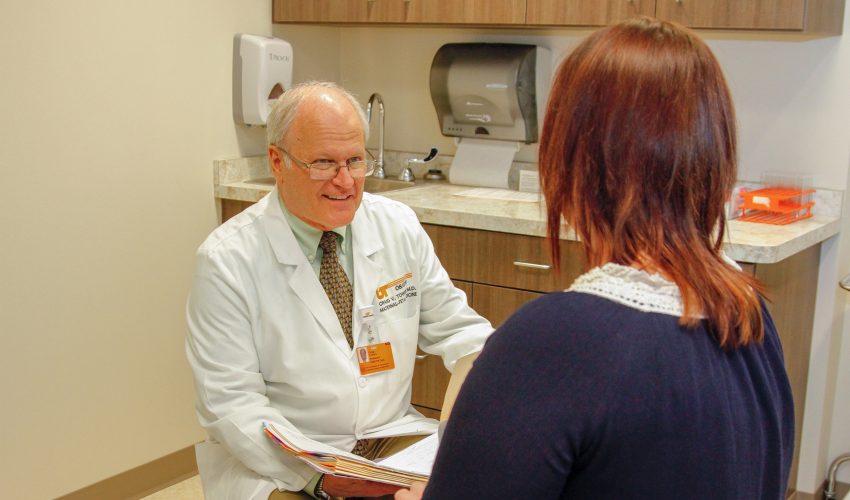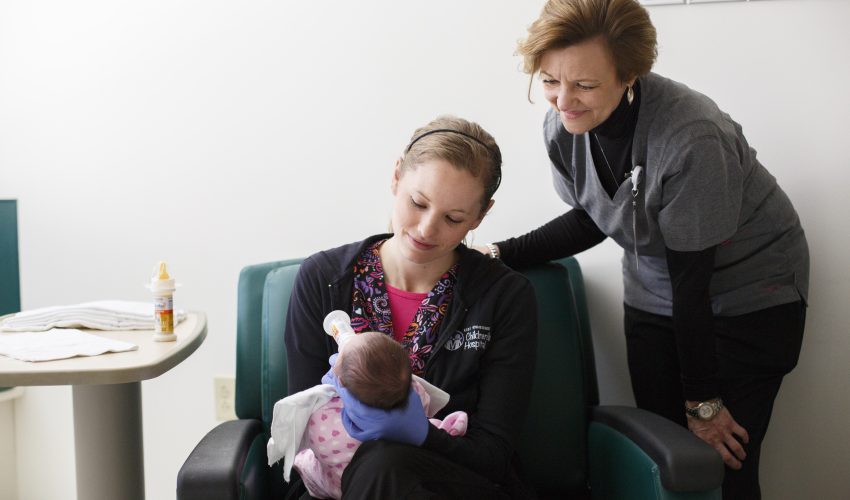For the past decade, the opioid crisis has grown to near epidemic levels.
The problem has had a devastating impact in East Tennessee.
There, a large number of young women who get pregnant while addicted pass along their drug dependencies to their babies in the womb. These children then go through withdrawal soon after birth — a painful process known as Neonatal Abstinence Syndrome (NAS).
Dr. Craig Towers, a maternal fetal medicine specialist at The University of Tennessee Medical Center practicing with High Risk Obstetrical Consultants in Knoxville, has been instrumental in changing the way expectant mothers with substance abuse disorders are being treated. He has seen the number of NAS births decline dramatically in his own practice and hopes to see the numbers continue to go down across the country.
Better Tennessee spoke to him about his ongoing research.
Q&A
Better Tennessee: For many years, standard practice in the medical community was medication-assisted therapy for pregnant women with a drug addiction, while detoxing was discouraged.
What led you to question that?
Dr. Towers: I’m a specialist in maternal fetal medicine and have been doing high-risk OB for about 35 years. Even I taught other physicians, nurses, residents and fellows that detoxing during pregnancy was harmful.
When I came to Knoxville about eight years ago, I was amazed at how many of my pregnant patients had opioid addiction issues. The first thing they would say is that they didn’t plan on getting pregnant and the second was, “I want to get off these drugs so my baby doesn’t suffer from my usage.”
I would tell them that detoxing during pregnancy wasn’t recommended because there were studies that have shown it is harmful to the baby and increases the risk of stillbirth.
I got asked about this so often, I started feeling like a broken record. I decided that I would find the articles about those studies and give them to my patients in a little packet. They could read about it and then ask me any questions they had.
Well, interestingly enough, what I found was that this was based on two single patients in the world literature. Two single publications, each with one patient.

BT: How did you approach your own research?
Dr. Towers: We had been seeing patients who detoxed during their pregnancy for some time, and I started collecting data to put together a paper. It turned out that there were five other papers that showed no harm to the fetus when the mother detoxed.
Those five papers added up to about 350 patients who detoxed without harm to the fetus, but since they were published over the course of 24 years in five different journals and three different specialties, they got lost, so the standard of practice never changed.
My paper looked at 301 patients, almost as large as the five other papers combined.
It showed that detoxification was not harmful.
BT: The American College of Obstetricians and Gynecologists incorporated your recommendations for detox as an option, but still suggests medication-assisted therapy.
How willing do you think doctors are to adopt detox as an approach?
Dr. Towers: It would depend on which group of doctors you talk to. The majority of obstetricians — about 75% — in the U.S. believe that detox should be offered as an option to addicted pregnant women. More than half of pediatricians are in favor of it because they are realizing that there is continued harm for the baby. It is the addiction medicine people who are fighting it.
Their main argument now is that while it is not harmful to the fetus to detox, NAS is treatable and there is no data showing long-term problems for these kids. But they argue that there is a high chance the mom will relapse after the pregnancy and overdose because she’ll take the same amount of the drug she did before detoxing.
BT: The goal here is to reduce NAS, but are there other health benefits to the baby?
Dr. Towers: The belief has been that if you treat the NAS successfully then everything will be fine, but we are showing that is not true.
I am proving, in my most recent research, that babies with NAS have smaller head circumferences. This is harmful not only in the acute phase with NAS but also in the long term. A smaller head circumference increases the risk of learning disabilities, behavior issues and brain function abnormalities.


At East Tennessee Children's Hospital in Knoxville, they've created a program to treat NAS babies. Click the photo to learn more.
BT: And for the mother?
Dr. Towers: For the mother, there is a high chance that she will stay clean. I’ve treated more than 100 women who have been over opiates for more than a year now.
The thing about pregnancy is that the baby gives the mother the motivation to quit.
Other addicts usually have to hit rock bottom before they see that they have a problem and ask a doctor for help. Pregnancy is unique in that women are motivated to not harm their kid and to be a mother. One of the biggest questions among my patients is whether their baby will be taken away from them if they go through this, and the answer is no. They get to be a mom.
BT: What needs to happen to prevent relapse once the baby is born?
Dr. Towers: The psychosocial background of these women, at least here in Appalachia, is one of horrible abuse. They are not addicts because they were prescribed too many opiates after surgery.
They were sexually, physically or emotionally abused — or all three — at a young age. In fact, 65% of them have this history of trauma and believe that they deserved what happened to them.
We have to let them know that they were victims and that we are here to help them.
As moms, they grab hold of that and do very well.
After that, we follow up with our patients for three to six months and then transfer their care to a family practice or internal medicine physician, but we keep them with a behavioral health specialist and counseling.
They need constant contact. Many don’t have a car or shelter, or they live in a place where somebody else is dealing drugs or doing drugs, and you want to get them away from that.
Relapse is a real thing in this population, but it makes a difference if you stay with these women and gain their confidence. I have not had a woman overdose if she has relapsed because we talk about it. She knows if she fails to stay clean, she can’t take the same amount of drugs she did before detoxing.
BT: What are the next steps for your research?
Dr. Towers: We are doing long-term follow-up on the kids who have been detoxed.
So far it looks like they are doing better than their counterparts who suffered with NAS.




